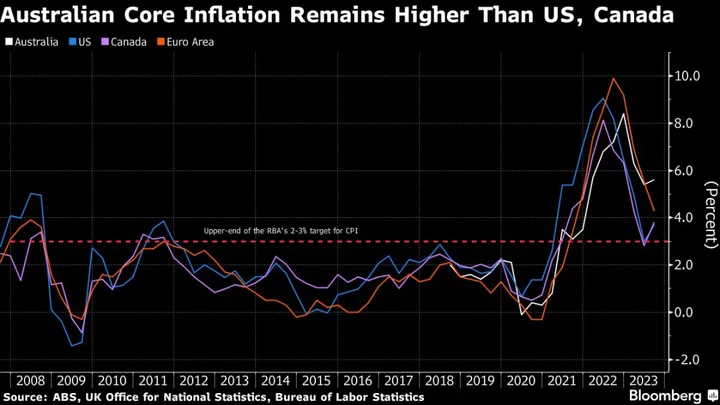Europe’s economy is expected to avert a recession, but getting inflation back to normal levels may take several years, according to the International Monetary Fund.
The growth outlook in Asia looks sour as China struggles to lure foreign investment, Hong Kong growth lags behind and Indonesian exports deteriorate.
In the US, inflation expectations continued to climb as consumers anticipated higher gas prices. Separate data from the Census Bureau show how inflation is still inflicting significant financial stress for many Americans.
Here are some of the charts that appeared on Bloomberg this week on the latest developments in the global economy:
Europe
Europe’s economy is unlikely to crash — even as a more-than yearlong bout of interest-rate increases tames inflation, according to the IMF. While rising wages are aiding Europe’s economic recovery, they also risk stoking further inflationary pressures — especially if they aren’t matched by improvements in productivity, the IMF said.
Less than a month after the opposition won a parliamentary election, Poland’s central bank is again worried about inflation. The U-turn is set to fan speculation about the role of politics in the governor’s policy calculus.
Asia
China is struggling in its attempt to lure foreigners back as data shows more direct investment flowing out of the country than coming in, suggesting companies may be diversifying their supply chains to reduce risks. Foreign direct investment fell $11.8 billion in the July-to-September period, marking the first contraction since records started in 1998.
Hong Kong lowered its economic growth forecast for this year in a sign that tough times are still ahead for the financial hub amid a muted post-pandemic recovery. The revision comes after the city reported weaker-than-expected third-quarter GDP growth, highlighting significant challenges to the economy despite a boost from the tourism revival.
Indonesia will ramp up the disbursement of social assistance in the coming months after government underspending halted seven straight quarters of above-5% growth. Indonesia’s slowest growth pace in two years underscores the headwinds to recovery for Southeast Asia’s largest economy. Exports, a key growth driver, shrank by the most since 2020.
US
US consumers’ long-term inflation expectations increased to the highest since 2011, while concerns about high borrowing costs and the economy’s prospects mounted in a fresh blow to sentiment. The report showed expectations for gasoline prices over the short and long run increased to the highest this year. That’s at odds with the current trend in prices at the pump, which have steadily fallen since late September.
US households tapped their credit cards more in the third quarter, when strong spending helped to power blockbuster economic growth. But Millennials and people with student debt and auto loans are falling further behind on payments.
Inflation may have faded but the strain it’s imposed on American households has not, according to Census Bureau polling. Southern states have the highest incidence of inflation stress.
Emerging Markets
Brazil’s retail sales rose more forecast after policymakers committed to maintaining their current pace of interest rate cuts for the coming months.
The world’s biggest oil producer is now also aiming to become a key hub for making batteries for electric vehicles, as authorities in Saudi Arabia look for new ways to diversify the economy and develop a domestic auto industry.
World
Australia’s central bank resumed raising interest rates in a widely anticipated move, while signaling a higher hurdle to further tightening. Poland’s central bank unexpectedly halted its easing cycle, while Mexico kept rates at a record high for a fifth straight meeting. Peru cut interest rates for a third straight month.
China is overhauling the way it lends to developing nations, a strategy that may help their largest official creditor maintain a narrowing lead over the US and its Group of Seven allies. Beijing has begun moving away from the big bilateral deals it was eager to strike a decade ago — when it first launched its flagship Belt and Road Initiative that mainly lends to infrastructure projects.
--With assistance from Rebecca Choong Wilkins, Shawn Donnan, Claire Jiao, Francine Lacqua, John Liu, Xinyi Luo, Mirette Magdy, Jonnelle Marte, Reade Pickert, Andrew Rosati, Zoe Schneeweiss, Grace Sihombing, Alex Tanzi, Fran Wang and Alexander Weber.

